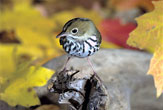Noise Pollution Threatens Birds

Get the world’s most fascinating discoveries delivered straight to your inbox.
You are now subscribed
Your newsletter sign-up was successful
Want to add more newsletters?

Delivered Daily
Daily Newsletter
Sign up for the latest discoveries, groundbreaking research and fascinating breakthroughs that impact you and the wider world direct to your inbox.

Once a week
Life's Little Mysteries
Feed your curiosity with an exclusive mystery every week, solved with science and delivered direct to your inbox before it's seen anywhere else.

Once a week
How It Works
Sign up to our free science & technology newsletter for your weekly fix of fascinating articles, quick quizzes, amazing images, and more

Delivered daily
Space.com Newsletter
Breaking space news, the latest updates on rocket launches, skywatching events and more!

Once a month
Watch This Space
Sign up to our monthly entertainment newsletter to keep up with all our coverage of the latest sci-fi and space movies, tv shows, games and books.

Once a week
Night Sky This Week
Discover this week's must-see night sky events, moon phases, and stunning astrophotos. Sign up for our skywatching newsletter and explore the universe with us!
Join the club
Get full access to premium articles, exclusive features and a growing list of member rewards.
Loud ambient noise affects the sex lives of birds, a new study suggests.
Man-made noise is increasing in the wild. Because birds communicate mainly by sound, loud environments interfere with their communications and reduces pairing by almost 15 percent.
“This was the first study to isolate noise as the key mechanism influencing pairing success,” said study co-author Erin Bayne, a researcher from University of Alberta.
Battle of the notes
Bayne and colleagues compared the pairing success of ovenbirds, Seiurus aurocapilla—small birds named for building a domed nest with a side entrance—in noisy compressor stations with noiseless areas in the boreal forest region of Alberta, Canada. Compressor stations generate pressure in pipelines to keep natural gas and oil flowing from wells. [Click to hear ovenbird song.]
Ovenbird pairing success was 92 percent in noiseless well pads but was reduced to 77 percent at compressor sites, the researchers note in the online early issue of the Journal of Applied Ecology.
This is most likely due to the fact that a male’s song is drowned out, reducing the number of females that can hear him, said lead author Lucas Habib from University of Alberta. “However, another possibility is that the noise distorts the male's song. Female birds select mates, in part, based on the quality of certain cues in their songs. If the noise distorts a song, a female may think that the male singing is of lower quality than he actually is. “
Get the world’s most fascinating discoveries delivered straight to your inbox.
A typical compressor station produces chronic noise levels of up to 90 decibels nearby, similar to the sound of a lawnmower.
This range is similar to previous studies that found negative effects of road noise on birds. However, because the forest areas are relatively isolated, factors such as traffic and human intervention were controlled for, the researchers note.
Earplugs for all birds
“For ovenbird males, these results suggest that where they put their territory in relation to noise matters,” Bayne told LiveScience.com. “We believe this will affect other species as well. We have found several other species whose abundance is reduced near compressor stations which supports this finding.”
The researchers think that as noise pollution spreads, there will be fewer quiet spots left for birds. If birds continue to avoid noisy areas, their population could decline.
The situation could be alleviated if humans take measures to reduce noise pollution.
“In the case of compressor stations, technology is available to reduce noise levels through increased insulation of noise generating equipment, sound baffles, and silencers,” Bayne said.
- All about birds
- Images: Rare and Exotic Birds
- Video: How a Songbird Sings
- How Songbirds Change Tune
- Ship Noise Drowns Out Whale Talk, a Threat to Mating
 Live Science Plus
Live Science Plus











